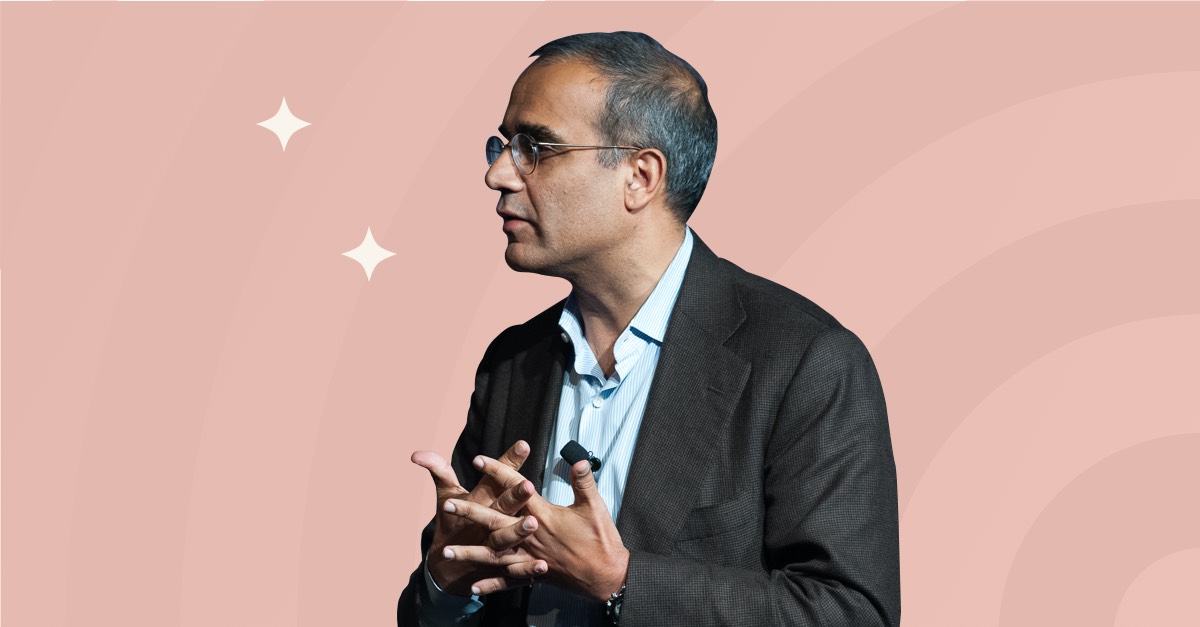Flight Templates are templated flights, or sets of questions, written by some of the world’s preeminent business leaders. With Flight Templates, Balloon users get unparalleled access to seasoned perspectives and proven business strategies across all areas of business, including leadership, product, marketing & sales, innovation, employee experience, culture, and more. This feature is part of a series on The Insight that profiles Balloon’s Flight Template authors.
When asked to explain what drives his business philosophy, Rishad Tobaccowala often thinks of two quotes: “We tell ourselves stories in order to live,” from Joan Didion, and “All sorrows can be borne if you put them into a story or tell a story about them,” from the Danish author Karen Blixen, composed under her pen name Isak Dinesen.
Between his education in mathematics and business, his tenure as the Chief Growth Officer of the 80,000-person advertising firm Publicis Groupe, and his current role as an adviser to several C-level executives, Tobaccowala’s career has been mired in hard science and data analytics for the good part of four decades. Still, the University of Chicago graduate, sought-after keynote speaker, and newly-minted author considers himself a writer at heart, and he knows that, in order to succeed in business, well-articulated stories are just as important as well-analyzed data.
“To me, where human life and business life and the world intersect is stories,” Tobaccowala said. “Successful businesses combine the story and the spreadsheet. It's not about one or the other.”
In fact, the working title for Tobaccowala’s book was “the Story and the Spreadsheet,” before HarperCollins eventually decided that Restoring the Soul of Business: Staying Human in the Age of Data would garner more attention (which it did, admirably). Restoring the Soul of Business covers extremely prescient topics like how to manage distributed teams, how to lead during times of change, and how to identify and adapt to the best new technology; so it came as a surprise to many of its readers that the incredibly relevant Restoring the Soul of Business was published pre-pandemic, in January 2020.
“All that COVID did was accelerate what I anticipated,” Tobaccowala said. “People thought I must’ve known COVID was coming, but of course I didn’t—if I did, I would’ve stopped the man from eating the bat, or whatever it was. I simply knew that we were living in times of change, that technology was going to allow for a big shift toward distributed work, and that it was becoming more and more clear that companies that do not balance their data with their story would eventually fail.”
Tobaccowala noted companies like Wells Fargo and United Airlines as primary examples of companies that have made huge missteps by trying to assuage unfavorable data with more, often faked or adjusted, data, and WeWork as one that leaned so far into its story that it didn’t have the data to back up the success it was claiming. For smaller companies, Tobaccowala warned, such an unbalanced mindset would almost certainly be a harbinger of inevitable failure.
“The spreadsheet is extremely important, but it’s like the scoreboard at a tennis match, when the ball and the tennis player are the plot. If you measure the game by only looking at the scoreboard, you won’t get the whole story. But if you watch what happens to the ball and the player, you’ll get a lot more,” Tobaccowala said, exercising his knack for metaphors. “But if you combine the two, you get Southwest airlines, not United. You get Costco, not Walmart. You get a new Microsoft under Satya Nadella, who pushed the company’s mindset from know-it-all to learn-it-all.”
These days, his work echoes his philosophy: he uses stories as vehicles, to carry and move data and information critical for modern businesses.
“I help people see, think, and feel differently about how to grow themselves, their teams, and their business, and I do it in three ways,” Tobaccowala said. “I have what I call my one-to-many model, which is writing; my one-to-some model, which is speaking and teaching; and my one-to-one model, which is advisory.”
Always eager to disseminate the wisdom he has collected throughout his 38-year career, Tobaccowala is now sharing his five-part flight template series, Balancing Data and Storytelling. The series guides data-minded teams through four situations, all with that critical story-spreadsheet dichotomy top of mind.
- Holistic Data Analysis
- Talk about the Turd on the Table
- Meeting Management and Agenda-Setting
- Build Your Brand Story
- Lead with Soul
While his series functionally lives on that one-to-many branch of his professional life, the specificity and the recursive component of the flight templates (gleaning meaning from data sets gathered from flights that focus on gleaning meaning from data) feel so personal and thorough that the series is perhaps the next best thing to one-on-one advisory from Tobaccowala himself.
His philosophy, too, gives a new meaning to the term “work-life” balance: Imbue your work—your workplace and the work you and your team produce—with life, Tobaccowala insists, or fall irrevocably behind the competition.
“Data is like electricity. You can't live without it. But tell me about a company that differentiates with its use of electricity,” Tobaccowala said. “The fact is, we're living in a data-driven, digital, silicone-based age, but we're analog, emotional, carbon-based, people. If you pretend we’re not, you’ll do yourself an incredible disservice.”
